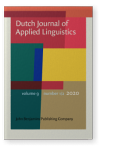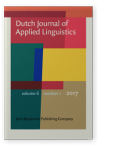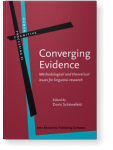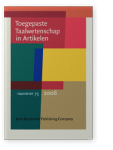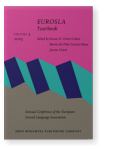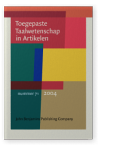Maria Mos
List of John Benjamins publications for which Maria Mos plays a role.
Journal
2024 Individual variation in contact effects – stability, convergence, and divergence Linguistic Approaches to Bilingualism: Online-First Articles | Article
In this study, we investigate the contact effects of stability, convergence, and divergence regarding the use of the same linguistic construction in the same contact situation. To do that, we collected experimental production and judgment data by native German speakers living in the Netherlands… read more
2017 Local and global pitch perception in L1 and L2 readers of Dutch Dutch Journal of Applied Linguistics 6:1, pp. 100–118 | Article
Prior research showed a relationship between reading skills and pitch perception, however the exact nature remained unclear. By means of reading tests and a pitch perception test, we examined the relation between reading abilities and local and global pitch perception for 92 native Dutch… read more
2011 Islands of (im)productivity in corpus data and acceptability judgments: Contrasting two potentiality constructions in Dutch Converging Evidence: Methodological and theoretical issues for linguistic research, Schönefeld, Doris (ed.), pp. 165–192 | Article
Dutch has a number of constructions for expressing that a particular event is likely or possible. Two of these, one using a derivational morpheme and the other a copula construction, are investigated to see whether they are both productive and to what degree their meanings overlap. Their… read more
2006 Complexe Woorden In Het Mentale Lexicon Van Kinderen Toegepaste Taalwetenschap in Artikelen 75, pp. 53–65 | Article
Do children's representations of complex words in their mental lexicon have an internal structure, with the stem as a separate unit? De Jong et al (2000) found that adults recognize words with a large Family Size, i.e. words occurring in many derivations and compounds, faster than equally frequent… read more
2005 Cognitive task complexity and second language writing performance EUROSLA Yearbook: Volume 5 (2005), Foster-Cohen, Susan H., María del Pilar García Mayo and Jasone Cenoz (eds.), pp. 195–222 | Article
This paper reports on a study in which two models proposed to explain the influence of cognitive task complexity on linguistic performance in L2 are tested and compared. The two models are Robinson’s Cognition Hypothesis (Robinson 2001a, 2001b) and Skehan and Foster’s Limited Attentional Capacity… read more
2004 Woord Voor Woord. De Invloed Van Semantische En Vormelijke Clustering Op Het Leren Van De Betekenis Van Spaanse Werkwoorden Toegepaste Taalwetenschap in Artikelen 71, pp. 113–124 | Article
According to the distinctiveness hypothesis, words are best learned together if they are distinct; otherwise, cross-association may occur, i.e., words are confused. This means that clustering words thematically in instructed second-language acquisition is potentially disadvantageous for the speed… read more
